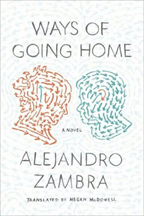Ways of Going Home, by Alejandro Zambra, translated from the Spanish by Megan McDowell. FSG, 2013. $23.00, 160 pages.
Alejandro Zambra’s much-anticipated third novel, Ways of Going Home, is a timely and intimate meditation on Chile. It is ambitious in its understated earnestness, provocative in its political messaging, and universal in its grasp at memories for meaning, identity, and voice.
As the title suggests, this novel is concerned with literary ways of probing memories that connect to home. In this case, home is Chile but is equally the 1980s, parents, family, friends, neighbors, and literature. The memories are those of the generation who were children during the regime of Augusto Pinochet.
The novel unfolds in four parts, alternating between a childhood and present day (i.e., the Chilean presidential election of 2009-2010). The past is a memoir of a nine-year-old boy in the mid-80s and then twenty years later; the present is a diary by its author. While it could be argued that these inconsistent narrative techniques do not coexist well, that these even unravel each other, there is a moving effect in the struggle on the author’s part to work toward a voice, and even language, for the complicity and victimization of one’s parents under a brutal regime.
In the novel’s opening, a boy of six or seven gets lost from his parents and finds his way home. This is in Santiago, the city where they live. Though frightful for anyone who has experienced the threat of losing sight of his or her child, the episode devolves into an amusing anecdote. The boy doesn’t react with this heightened fear but instead simply finds his way home. And then at home, after some time has passed, he begins to worry that his parents got lost: “I knew how to get home and they didn’t.” It’s a wonderfully circular meditation, a kind of misdirection on the author’s part that turns the camera from the child to the parents. All of this in the opening sets the stage for a story in which turning of the camera emerges as a pattern: the boy regarding his parents and his parents’ generation in the context of what was happening in Chile.
An earthquake begins this boy’s story which revolves around his relations with a girl, Claudia. During the earthquake, neighbors come together in a rare moment of camaraderie around a bonfire: “It was strange to see the neighbors all gathered together, maybe for the first time ever.” Again, an insightful observation within the context of Chile’s troubled times. The family’s neighbor, a man named Raul, has brought his sister and niece to the gathering, and though there is some sense of neighborhood, there is not a sense of belonging together. Later Claudia asks him to spy on her uncle Raul, and there is much speculation about events witnessed and people encountered while spying on Raul. It is not until much later that we are able to piece together a reasonable version of what was occurring and its significance.
The other two sections are made up of a diary by the fictional author of the boy’s story. Probing his generation’s memories is this author’s work at hand even in his diary. One of the central characters is a past lover Eme (in fact, the author’s diary largely obsesses with Eme’s reading of his manuscript). In one of the diary entries, he recounts Eme’s story of when, at seven or eight years old, she played hide-and-seek with other girls late in the day in the yard. When the parents stopped calling for them, the children realized that inside the house “her father’s friends were crying and that her mother…was staring off into space” while listening to news on the radio about a raid that had happened, and “about the dead, about more dead.” Later in the book, the children—including the author—turn out to be secondary characters.
And here in closing this diary entry of Eme’s story, he writes a moving reflection that again asserts Zambra as one of the most important writers of the new wave of Chilean authors: the author explains that his generation grew up believing that the “novel” belonged to their parents—Zambra has said that those of his generation in the 80s were secondary characters in the literature of their parents. The children cursed their parents while taking “refuge in their shadows, relieved.” He writes: “While the novel was happening, we played hide-and-seek, we played at disappearing.”
It seems evident that Zambra would like us to weigh his stories within the context of Chile’s recent presidential election. How much of this book does Zambra intend to serve as a wake-up call following the 2009-2010 election of Chile’s first right-wing president in two decades? And the upcoming 2013 bids for the presidency? One of the most direct instances of political messaging, after noting that Sebastián Piñera will win: “It seems horrible. It’s obvious we’ve lost our memories.” The diary language here is notably passive; there is a despair, almost a resignation. One might hope for more, but melodrama is not Zambra’s style.
In the diary section that closes Ways of Going Home, while the fictional author continues to struggle in his effort to find voice and rationale for his novel, an earthquake hits Santiago, as it did for him twenty years earlier—the earthquake scene with which he opened his novel. Out on the streets afterward, he encounters people who say to him, We’re all right. It is the title and theme of the closing. The author experiences “a strange flicker of happiness,”—“strange” because otherwise the mood is grim, the writing work must continue to give meaning to all that has happened in past, present, and future.

